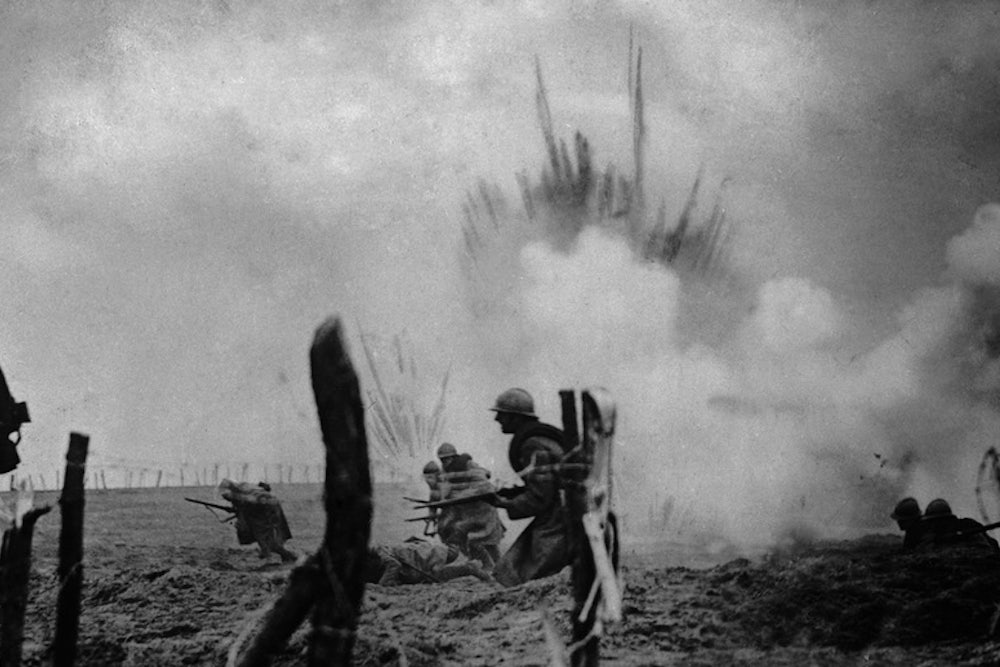The recent row between Japan and its neighbors over how that country chooses to remember its role in World War II has proven, once again, that history can be controversial. It has also shown that there is real value in making moral judgments about past behavior—or at least moral judgments that have some relationship to the truth.
America's role in World War I is certainly not comparable to Japan's role in World War II, but it is still worth trying to recall that war with accuracy. And accuracy, of course, would call for questions about why we engaged in the war at all. Unfortunately, President Obama's remarks on Wednesday at the American cemetery in Belgium were inaccurate, misleading, and off-key.
Obama began by describing himself and all Americans as "in debt" to those who fought in the First World War. He followed that up by noting, "And it is impossible not to be awed by the profound sacrifice they made so that we might stand here today." Obama didn't bother to explain exactly how these young men had given their life for our freedom, because such a connection would have been impossible to make. The only things that we can say for certain that WWI delivered to future generations were fascism and Communism, and specifically Nazism and Stalinism. (So in one sense Obama was right: by enabling the rise of fascism, WWI did eventually allow American soldiers to help save the world!)
Obama continued as follows:
"We talked about how many of the Americans who fought on Belgian soil during the Great War did so under the command of His Majesty's great-grandfather, King Albert. And while they didn't always share a common heritage or even a common language, the soldiers who manned the trenches were united by something larger—a willingness to fight, and die, for the freedom that we enjoy as their heirs."
It is downright bizarre to talk about the Allies fighting for freedom when many of the Allied countries were barely free. At least Obama's mention of fighting under a monarch makes this same point in admittedly accidental fashion, because the men who fought in WWI were fighting, in many cases, for their monarchs or dictators, who themselves were quarreling with other monarchs and dictators over everyone's imperial reach and power. (The fact that the German and British monarchs were first cousins only adds to the pathetic absurdity of the whole endeavor.)
As if to add to the monarchical and imperial nostalgia of the whole event, Obama made one interesting reference. "In this place, we remember the courage of 'Brave Little Belgium.'" These last three words formed a patriotic phrase in Britain in 1914 after Belgium was taken over by Germany. Imperialists like Kipling and government spokespeople claimed that Britain and the Allies were engaging in the war to protect the brave little Belgians, and prevent a humanitarian catastrophe. (German behavior in Belgium was indeed terrible, although many atrocity stories were manufactured by the British press. And Belgian freedom was not the reason Britain went to war.)
The worst part of Obama's speech, however, was this comment: "Here, we visited the grave of a young Polish immigrant to America who just a few hours into his very first battle gave his life for his adopted country." Isn't there something grotesque about celebrating the life of an immigrant who made it all the way to America only to waste his life on a stupid imperial European war that the United States decided to get involved in?
It's true that Obama is the president and thus feels an understandable need to celebrate those who fought in America's wars. But a better way to remember the men who fought and died in World War I is to say that they tragically went (or were sent) to fight in a conflict that should never have begun, and in any event should never have been joined by the United States. As someone who was elected thanks to his opposition to a different misguided war that "should nebver have been authorized," Obama should have the courage to say so.
